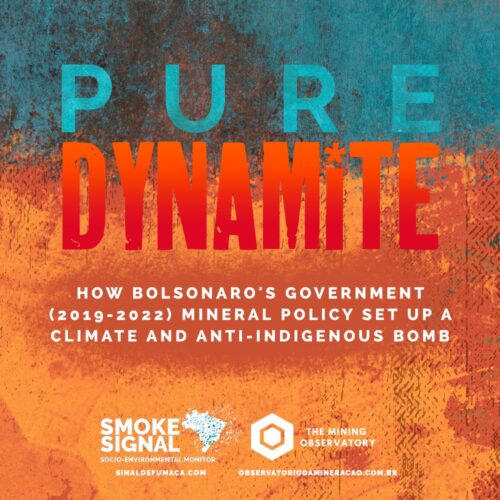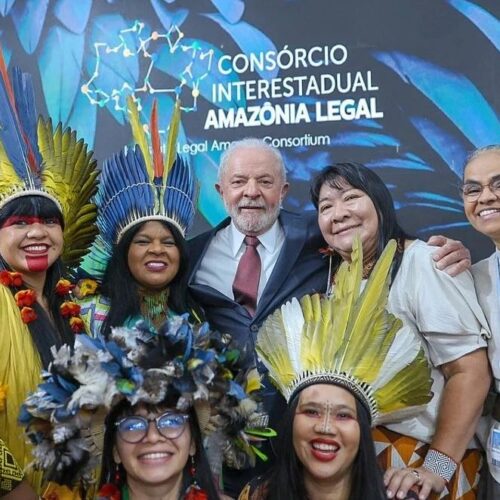10 May 23
Smoke Signal’s report on mining is featured in more than 350 vehicles and generates debate and hearings in the House of Representatives and in the Senate
The report Pure Dynamite: how Bolsonaro’s Government (2019-2022) Mineral Policy Set Up a Climate and Anti-Indigenous Bomb released on March 27 by the Mining Observatory and Smoke Signal, has been generating debate and resulted in public hearings in the House of Representatives and the Senate.
The document, which analyzed the Brazilian mineral policy during the Bolsonaro government, pointed out the existence of illegal favoring to the mining industry, and called into into question the system of self-licensing and mineral exploration in indigenous lands.
The report was featured in more than 350 media outlets, including Agência Brasil, TV Brasil and Miriam Leitão’s column in O Globo, generating reactions from both environmentalists and the mining industry.
On Thursday, April 27, the House of Representatives held a public hearing on the report’s findings, stocking the debate on the Brazilian mineral policies. Participating in the hearing were Daniel Pollack, Superintendent of Revenue at the National Mining Agency (ANM), Maurício Ângelo, Founder and Director of the Mining Observatory, and Rebeca Lerer, founder and coordinator of Smoke Signal.
“There has been a shock indoctrination, with fake news and disinformation, in addition to deregulation (of legislation), equipping of social control institutions, demobilization of control bodies, and criminalization of social movements. We saw a mix of tactics to advance a predatory land use agenda, whether for mining or agriculture, which resulted in increased violence and deforestation,” said Lerer.
The hearing participants contributed with questions about the situation of miners, the proper destination of CFEM (Financial Compensation for Mineral Exploration) resources in the municipalities, and the impossibility of pointing an example of “sustainable mining”. You can watch the public hearing on Youtube.
On Wednesday, May 10, the Federal Senate hosted a debate on the “Pure Dynamite” report and examined the 4 years of climate and anti-indigenous activities carried out by the government of Jair Bolsonaro. The event was attended by several experts, including Maurício Angelo of the Mining Observatory, André Elias Marques, Ombudsman of the National Mining Agency, and Suely Araújo, former president of Ibama and senior public policy specialist at the Climate Observatory, as well as the remote participation of Rebeca Lerer, coordinator of Smoke Signal, and Juliana de Paula Batista. representing the Socio-environmental Institute (SISA).
The main focus of the debate was “mineral denialism” and self-licensing in the mining sector on indigenous lands. In addition, it was discussed that mining represents only about 1% of Brazilian GDP, consumes 11% of electricity, and employs only 200,000 people, many of them in high-risk, outsourced activities. Environmental licensing was another highlight, with pressure from mining companies and industry to include mining in the Licensing Law (PL 3729). The influence that mining companies have on the licensing process was seen as a problem, as they have encouraged dams in an imminent state of disruption throughout the country. The full debate is available on the Senate website.
Sources:



















